Ruth 2 meaning explained in AI Summary
In Bethlehem, Ruth gleans in the fields to provide for herself and Naomi. She comes to the field of Boaz, a wealthy landowner and relative of Naomi's deceased husband. Boaz is impressed by Ruth's diligence and loyalty and shows her favor by instructing his workers to leave extra grain for her. He also invites her to eat with them, demonstrating kindness and generosity. Naomi sees Boaz as a potential kinsman-redeemer for Ruth.
Chapter 2 of the book of Ruth details how Ruth, a widowed Moabite woman, finds herself at work in the fields of Boaz, a wealthy landowner and relative of her deceased husband.
1. Ruth Seeks Provision: Ruth proactively asks Naomi, her mother-in-law, for permission to glean grain in the fields after the harvesters have passed through. This was a provision allowed for the poor and widowed in Israelite society.
2. A Fortunate Encounter: By a stroke of luck (or perhaps divine providence), Ruth ends up gleaning in the field belonging to Boaz, a man of character and a kinsman-redeemer to Naomi's family.
3. Boaz's Kindness: Boaz notices Ruth and inquires about her. He is impressed by her loyalty to Naomi and her industrious spirit. He shows her extraordinary kindness by:
* Granting her permission to glean in his field.
* Inviting her to eat with his workers.
* Instructing his men to leave extra grain for her.
* Protecting her from potential harm.
4. Ruth's Gratitude: Ruth is overwhelmed by Boaz's generosity and expresses her deep gratitude. She acknowledges his kindness and her status as a foreigner.
5. Naomi's Hope: When Ruth returns to Naomi and recounts the day's events, Naomi recognizes Boaz's actions as significant. She sees hope for the future and instructs Ruth to continue gleaning in his field.
Significance of Chapter 2:
- God's Providence: The chapter highlights God's unseen hand guiding events to provide for Ruth and Naomi.
- Boaz's Character: Boaz is presented as a righteous and compassionate man, foreshadowing his role as a redeemer.
- Ruth's Faithfulness: Ruth's hard work, humility, and loyalty are evident, showcasing her admirable character.
- Hope for the Future: The chapter ends on a note of hope, hinting at the possibility of redemption and restoration for both Ruth and Naomi.
Ruth 2 bible study ai commentary
This chapter narrates the unfolding of God's providence through human actions. Ruth, acting in faith and diligence, seeks to provide for her family. What appears to be a chance encounter (miqreh) is revealed to be the sovereign guidance of God, leading her to the field of Boaz, a kinsman-redeemer. The chapter is a masterful display of chesed (covenant loyalty and loving-kindness), first from Ruth towards Naomi, and then from Boaz towards Ruth, foreshadowing the redemptive grace available to all, including Gentiles, who take refuge in the God of Israel.
Ruth 2 Context
The events occur during the period of the Judges, a time of social, spiritual, and moral chaos in Israel, described as when "everyone did what was right in their own eyes" (Judges 21:25). This chapter provides a stark and beautiful contrast to that setting, showcasing a community living with piety and integrity. Key cultural practices include the law of gleaning (Leviticus 19:9-10; Deuteronomy 24:19), a divinely mandated welfare system allowing the poor, the sojourner, the orphan, and the widow to gather leftover grain. The concept of the goel, or kinsman-redeemer, a male relative tasked with protecting the family's interests, property, and lineage, is also central to the unfolding narrative.
Ruth 2:1
And Naomi had a relative of her husband's, a worthy man of the clan of Elimelech, whose name was Boaz.
In-depth-analysis
- A relative: The Hebrew môdaʿ signifies a kinsman, establishing a legal and social connection from the outset.
- Worthy man: The phrase is 'îš gibbôr ḥayil.
- gibbôr means mighty or valiant.
- ḥayil means strength, wealth, virtue, or ability.
- This isn't just a "mighty warrior" but a man of significant social standing, wealth, and noble character. It's the same description given to the ideal woman in Proverbs 31:10 ('ēšet ḥayil), which will be applied to Ruth herself (Ruth 3:11).
- Of the clan of Elimelech: This is a crucial detail, establishing Boaz's qualification to act as a kinsman-redeemer (goel) for Naomi and Ruth.
- Boaz: His name likely means "in him is strength," fitting his character and role in the story.
Bible references
- Ruth 3:11: '...all the people of my town know that you are a worthy woman ('ēšet ḥayil).' (Direct parallel of Boaz's characterization).
- Proverbs 31:10: 'An excellent wife ('ēšet ḥayil) who can find? She is far more precious than jewels.' (The female equivalent of Boaz's status).
- Judges 6:12: '...the angel of the LORD appeared to him and said to him, “The LORD is with you, O mighty man of valor (gibbôr heḥāyil)!”' (Same term used for Gideon).
Cross references
1 Kings 1:42 (man of valor); Prov 12:4 (virtuous woman); Judges 11:1 (Jephthah as a mighty warrior).
Ruth 2:2
And Ruth the Moabitess said to Naomi, “Let me go to the field and glean among the ears of grain after him in whose sight I shall find favor.” And she said to her, “Go, my daughter.”
In-depth-analysis
- Ruth the Moabitess: The narrator continually emphasizes her foreign origin, highlighting the extraordinary nature of her faith and Boaz's grace.
- Let me go: Ruth takes the initiative. She is not passive or despairing but actively seeks to provide, demonstrating her faithfulness (chesed) to Naomi.
- Glean: She is acting on her rights as a poor sojourner under the Law of Moses. Gleaning was hard, humbling work.
- Find favor (Hebrew: chen): This is a key word, often translated as grace. Ruth does not demand her rights but humbly hopes for a landowner's gracious permission. This posture of humility opens the door to Boaz's even greater generosity.
Bible references
- Leviticus 19:9-10: 'When you reap the harvest of your land, you shall not reap your field right up to its edge... you shall leave them for the poor and for the sojourner: I am the LORD your God.' (The legal basis for Ruth's action).
- Deuteronomy 24:19: 'When you reap your harvest in your field and forget a sheaf... it shall be for the sojourner, the fatherless, and the widow, that the LORD your God may bless you...' (Shows gleaning was God's direct provision).
Cross references
Lev 23:22 (law of gleaning); 2 Thess 3:10 (principle of work); 1 Tim 5:8 (providing for one's own).
Ruth 2:3
So she set out and went and gleaned in the field after the reapers, and she happened to come to the part of the field belonging to Boaz, who was of the clan of Elimelech.
In-depth-analysis
- She happened to come: The Hebrew is wayyiqer miqrehā. This literally means "her chance chanced upon." The narrator uses the language of coincidence to describe what the reader is meant to understand as divine providence. God’s sovereignty is veiled behind the "chance" events of everyday life.
- This verse is the theological center of the chapter: God’s unseen hand guides Ruth precisely to the one man who can and will redeem her.
Bible references
- Proverbs 16:9: 'The heart of man plans his way, but the LORD establishes his steps.' (The theological principle behind Ruth's "chance").
- Genesis 24:27: '...As for me, the LORD has led me in the way to the house of my master's kinsmen.' (Abraham's servant recognizing God's guidance in "finding" Rebekah).
- Luke 10:31: 'Now by chance a priest was going down that road...' (Jesus using the language of chance to set up a story of moral responsibility in the Good Samaritan).
Cross references
Prov 16:33 (the lot is cast but its decision is from the Lord); Esth 6:1 (the king 'happens' to read the chronicles).
Polemics
The use of "chance" is a subtle polemic against the fatalistic beliefs of the Ancient Near East, where events were often attributed to the unpredictable whims of impersonal gods. The Bible consistently presents "chance" from a human perspective, while affirming that a personal, sovereign God is purposefully guiding events towards His redemptive goals.
Ruth 2:4
And behold, Boaz came from Bethlehem. And he said to the reapers, “The LORD be with you!” And they said to him, “The LORD bless you!”
In-depth-analysis
- Behold: The word hinneh signals a significant and often surprising arrival. The lord of the harvest appears.
- The LORD be with you! ... The LORD bless you!: This exchange reveals the pious, godly character of Boaz and his workers. This is not typical workplace banter; it reflects a community living in conscious awareness of God's presence. It is an idyllic portrayal that stands in stark opposition to the spiritual decay described in Judges.
Bible references
- Psalm 129:8: '...so that those who pass by do not say, "The blessing of the LORD be upon you! We bless you in the name of the LORD!"' (This psalm bemoans a situation where such blessings are absent, highlighting their value).
- Luke 1:28: 'And he came to her and said, “Greetings, O favored one, the Lord is with you!”' (Echoes the angelic greeting to Mary, linking divine favor and presence).
- Judges 6:12: "...The LORD is with you, O mighty man of valor!" (Gideon's calling, using similar language).
Cross references
Gen 28:15 (God's presence); 2 Thess 3:16 (Paul's blessing).
Ruth 2:5-7
Then Boaz said to his young man who was in charge of the reapers, “Whose young woman is this?” And the servant...answered, “She is the young Moabite woman who came back with Naomi... She said, ‘Please let me glean...’ So she came, and she has continued from morning until now, except for a short rest.”
In-depth-analysis
- Whose young woman is this?: Boaz immediately notices Ruth. This isn't just about identifying her but about understanding her status and situation.
- The servant's report is telling. He highlights:
- Her Identity: "the young Moabite woman," emphasizing her foreignness.
- Her Loyalty: "who came back with Naomi," explaining her commendable reason for being there.
- Her Humility: "Please let me glean," showing she didn't presume upon her rights.
- Her Diligence: "continued from morning until now," proving her strong work ethic.
- This positive report prepares Boaz to act with extraordinary grace.
Bible references
- Proverbs 31:31: 'Give her of the fruit of her hands, and let her works praise her in the gates.' (Ruth’s work speaks for itself, earning her praise).
Cross references
Col 3:23 (working heartily for the Lord); Ecc 9:10 (diligence).
Ruth 2:8-9
Then Boaz said to Ruth, “Now, listen, my daughter. Do not go to glean in another field or leave this one, but keep close to my young women... Let your eyes be on the field that they are reaping, and go after them. Have I not charged the young men not to touch you? And when you are thirsty, go to the vessels and drink...”
In-depth-analysis
- My daughter: A term of tender, protective affection. It immediately changes their relationship from landowner-gleaner to protector-protégée.
- Boaz’s instructions are threefold acts of grace:
- Provision: "Do not go to another field." He guarantees her access to sustenance.
- Fellowship: "keep close to my young women." He brings her from isolation into the community.
- Protection: "charged the young men not to touch you (naga')". This goes beyond simple contact; it means not to harm or molest her, a very real danger for a lone foreign woman. He creates a safe space for her.
- Drink from the vessels: He gives her access to the water provided for his own paid workers, a significant privilege.
Bible references
- John 4:13-14: Jesus said to her, 'Everyone who drinks of this water will be thirsty again, but whoever drinks of the water that I will give him will never be thirsty forever.' (Boaz providing water is a picture of Christ, the true source of living water).
- Psalm 23:1-2: 'The LORD is my shepherd; I shall not want. He makes me lie down in green pastures...' (Boaz acts as a shepherd, providing pasture, rest, and protection).
Cross references
Gen 20:6 (God prevents Abimelech from touching Sarah); Gen 26:29 (not harming Isaac).
Ruth 2:10-12
Then she fell on her face, bowing to the ground, and said to him, “Why have I found favor in your eyes, that you should take notice of me, since I am a foreigner?” But Boaz answered her, “All that you have done for your mother-in-law... has been fully told to me... The LORD repay you... a full reward be given you by the LORD, the God of Israel, under whose wings you have come to take refuge!”
In-depth-analysis
- Fell on her face: An act of profound gratitude and humility, recognizing the magnitude of the grace (chen) she has been shown.
- Foreigner (nokriyah): She identifies herself as an outsider with no claim to such kindness.
- Boaz’s reply reveals his motivation. He is not acting out of pity but in response to her demonstrated character—her chesed to Naomi.
- Under whose wings you have come to take refuge: This is one of the most beautiful theological statements in the Old Testament.
- It reframes Ruth’s journey not as an economic migration but as a spiritual pilgrimage to find refuge in Yahweh.
- Boaz pronounces a blessing, effectively acting as a priestly figure. He asks God to reward her for the very act of seeking Him.
Bible references
- Psalm 91:4: 'He will cover you with his pinions, and under his wings you will find refuge...' (A direct thematic parallel of seeking refuge in God).
- Matthew 23:37: 'O Jerusalem, Jerusalem... How often would I have gathered your children together as a hen gathers her brood under her wings, and you were not willing!' (Jesus uses the same metaphor, revealing that He is the ultimate refuge Boaz spoke of).
- Psalm 36:7: 'How precious is your steadfast love (chesed), O God! The children of mankind take refuge in the shadow of your wings.' (Directly links chesed and taking refuge under God's wings).
Cross references
Psa 17:8; Psa 57:1; Psa 61:4 (God's wings as refuge); Heb 11:6 (God rewards those who seek Him).
Ruth 2:13-14
Then she said, “I have found favor in your eyes, my lord, for you have comforted me and spoken kindly to your servant...” And at mealtime Boaz said to her, “Come here and eat some bread and dip your morsel in the wine.” So she sat beside the reapers, and he passed to her roasted grain. And she ate until she was satisfied, and she had some left over.
In-depth-analysis
- Spoken kindly: The Hebrew is literally "spoken to the heart," indicating words that bring deep comfort and encouragement.
- Invitation to the meal: This is a radical act of inclusion. Boaz elevates Ruth from a gleaner at the margins to a guest at his own table, sitting with his paid servants.
- He passed to her roasted grain: Boaz personally serves her, an act of great honor.
- Ate until she was satisfied, and she had some left over: This demonstrates the abundance of Boaz’s provision. It is not meager but overflowing. This is a recurring biblical theme of God's abundant grace.
Bible references
- John 6:12: 'And when they had eaten their fill, he told his disciples, “Gather up the leftover fragments, that nothing may be lost.”' (The feeding of the 5,000 shows a similar theme of miraculous, abundant provision with leftovers).
- Luke 14:13, 21: '...when you give a feast, invite the poor, the crippled, the lame, the blind... ‘Go out quickly to the streets and lanes of the city, and bring in the poor and crippled and blind and lame.’' (Boaz embodies the principle Jesus taught of radical hospitality to the marginalized).
- Ephesians 2:13, 19: 'But now in Christ Jesus you who once were far off have been brought near by the blood of Christ... So then you are no longer strangers and aliens...' (Ruth's journey from foreigner (nokriyah) to fellow diner is a type of the Gentiles' inclusion in the family of God).
Cross references
2 Sam 9:7-11 (David inviting Mephibosheth to his table).
Ruth 2:15-17
When she rose to glean, Boaz instructed his young men, saying, “Let her glean even among the sheaves, and do not reproach her. And also pull out some from the bundles for her and leave it for her to glean, and do not rebuke her.” So she gleaned in the field until evening. Then she beat out what she had gleaned, and it was about an ephah of barley.
In-depth-analysis
- Boaz now moves from public generosity to private, intentional provision.
- Glean even among the sheaves: This was forbidden territory for gleaners. Boaz grants her access to the best grain.
- Pull out some... and leave it: This goes far beyond the Law. He is not merely letting her glean; he is actively and secretly causing grain to be left for her. It is designed to preserve her dignity while ensuring her success.
- An ephah of barley: This was about 22 liters, or between 30-50 pounds of grain. It was an astonishing amount for a single day of gleaning, enough to feed two women for several weeks. This confirms the efficacy of Boaz’s secret provision.
Bible references
- 2 Corinthians 9:10-11: 'He who supplies seed to the sower and bread for food will supply and multiply your seed for sowing and increase the harvest of your righteousness. You will be enriched in every way to be generous...' (Boaz is a living example of a man blessed by God in order to be a conduit of generosity).
- Matthew 6:3: 'But when you give to the needy, do not let your left hand know what your right hand is doing,' (Boaz's private instruction to his men embodies this principle of discreet giving).
Cross references
Deut 15:10-11 (command to be openhanded to the poor).
Ruth 2:18-20
And she took it up and went into the city. Her mother-in-law saw what she had gleaned... And her mother-in-law said to her, “Where did you glean today...? Blessed be the man who took notice of you!”... And Naomi said to her, “The man is a close relative of ours, one of our redeemers.”
In-depth-analysis
- Naomi is astonished by the amount. Her first reaction is a blessing for the unknown benefactor.
- Took notice of you: This is the same word Boaz used in v. 10. Naomi recognizes this as extraordinary favor.
- Upon hearing the name Boaz, Naomi has a moment of revelation. Her bitterness from chapter 1 begins to dissolve.
- Blessed be he of the LORD: She immediately attributes Boaz's kindness to God's work.
- who has not forsaken his kindness (chesed) to the living and to the dead: This is a pivotal line. Naomi sees God's faithful love at work, continuing his care not only for her and Ruth (the living) but also for Elimelech and Mahlon (the dead), whose family line is at stake.
- One of our redeemers (gō'ălēnû): For the first time, the key legal and theological concept of the goel is introduced explicitly. The plot is now set. Hope is kindled.
Bible references
- Job 19:25: 'For I know that my Redeemer (goel) lives, and at the last he will stand upon the earth.' (Job's cry of faith in a divine Redeemer echoes the hope Naomi now finds in a human one).
- Leviticus 25:25: 'If your brother becomes poor and sells part of his property, then his nearest redeemer (goel) shall come and redeem what his brother has sold.' (The legal basis for the kinsman-redeemer's role).
- Isaiah 49:26: '...all flesh shall know that I, the LORD, am your Savior and your Redeemer (goel), the Mighty One of Jacob.' (God Himself is identified as the ultimate goel of Israel).
Cross references
Luke 1:46-49 (Mary's Magnificat, praising God for His mighty deeds); Prov 23:10-11 (The Lord as the Redeemer of the fatherless).
Ruth 2:21-23
And Ruth the Moabitess said, “Besides, he said to me, ‘You shall keep close by my young men until they have finished all my harvest.’” And Naomi said to Ruth...“It is good, my daughter, that you go out with his young women, lest in another field you be assaulted.” So she kept close to the young women of Boaz... until the end of the barley and wheat harvests. And she lived with her mother-in-law.
In-depth-analysis
- Naomi's wisdom: Naomi sees the protective wisdom in Boaz's offer, warning Ruth that she could be "assaulted" or harmed in another, unprotected field.
- Barley and wheat harvests: This period lasted about seven weeks, from Passover (barley) to Pentecost (wheat). This detail shows the duration of Boaz’s steady, generous provision and Ruth's faithful work.
- She lived with her mother-in-law: The chapter ends by reaffirming the central relationship. Ruth's motivation remains her covenant loyalty (chesed) to Naomi.
Bible references
- Leviticus 23:15-16: 'You shall count seven full weeks from the day after the Sabbath... You shall then present a new grain offering to the LORD.' (Describes the Feast of Weeks/Pentecost, marking the end of the harvest period).
Cross references
Prov 27:12 (the prudent sees danger and hides); John 15:4 (abiding in Christ).
Ruth chapter 2 analysis
- God's Hidden Providence: God is the main character of the book, yet He acts behind the scenes. He is not mentioned as acting directly, but his sovereignty is demonstrated through the "chance" meeting in v. 3, the virtuous character of Boaz, and Naomi’s recognition in v. 20 that Boaz's chesed is an extension of God's chesed.
- Chesed in Action: This chapter is a case study in loving-kindness. Ruth shows chesed to Naomi by working for her. Boaz shows extravagant chesed to Ruth, going far beyond the requirements of the Law. Naomi recognizes this as God's chesed to both "the living and the dead."
- A Sanctuary in a Time of Chaos: Set against the backdrop of the moral anarchy of the Judges period, Bethlehem under Boaz's influence is portrayed as an oasis of piety, respect, generosity, and order. The greetings in v. 4 are a powerful indicator of the community's spiritual health.
- Boaz as a Type of Christ:| Boaz | Jesus Christ || :--- | :--- || A man of great wealth and standing | Possesses all authority in heaven and earth (Matt 28:18) || Lord of the harvest | Lord of the harvest (Matt 9:38) || Offers refuge to a Gentile foreigner | The ultimate refuge for all nations (Eph 2:11-13) || Provides bread and drink | The Bread of Life and Living Water (John 6:35, 4:14) || Provides abundant leftovers | Provides more than enough (Matt 14:20) || Commands his workers not to harm her | Offers ultimate spiritual protection (John 10:28) || Is a Kinsman-Redeemer (goel) | Is our ultimate Kinsman-Redeemer (Heb 2:14-17) |
Ruth 2 summary
In an act of loyal love for Naomi, Ruth goes to glean and is providentially guided by God to the field of Boaz, a wealthy and noble relative. Boaz, having heard of Ruth’s faithfulness, shows her extraordinary kindness and grace, offering her protection, provision, and fellowship far beyond the requirements of the law. Ruth returns to Naomi with an abundance of grain, leading Naomi to recognize God's hand at work and identify Boaz as a potential kinsman-redeemer, sparking hope for the restoration of their family.
Ruth 2 AI Image Audio and Video

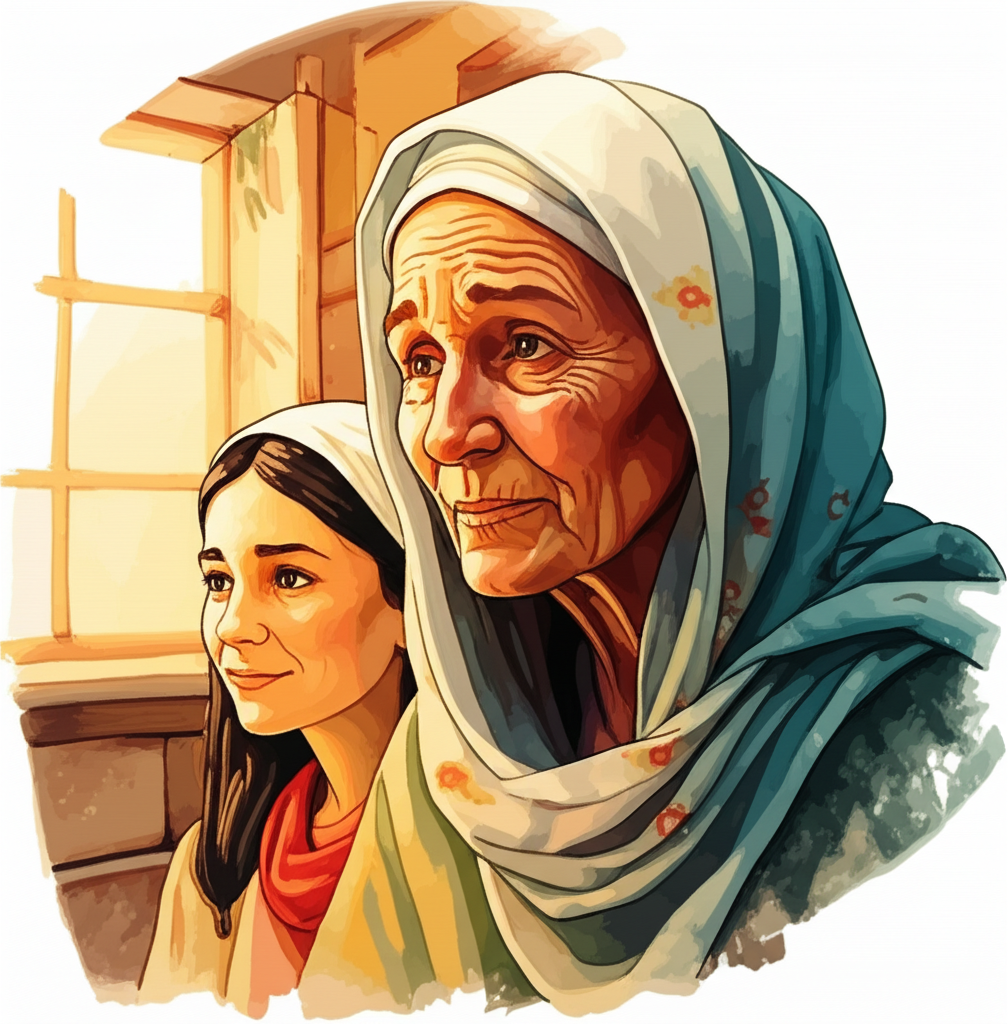
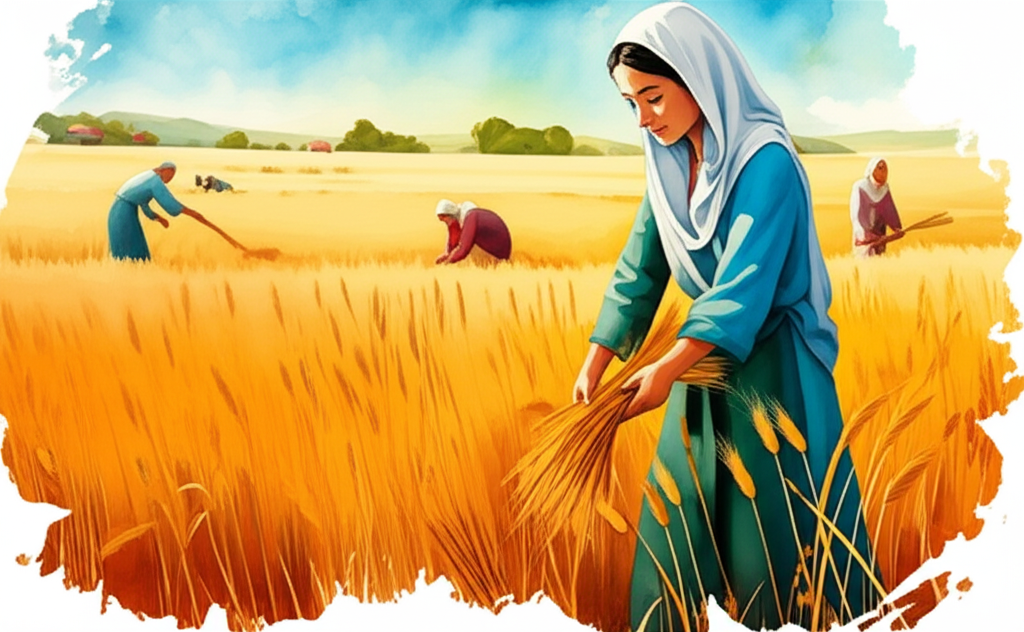
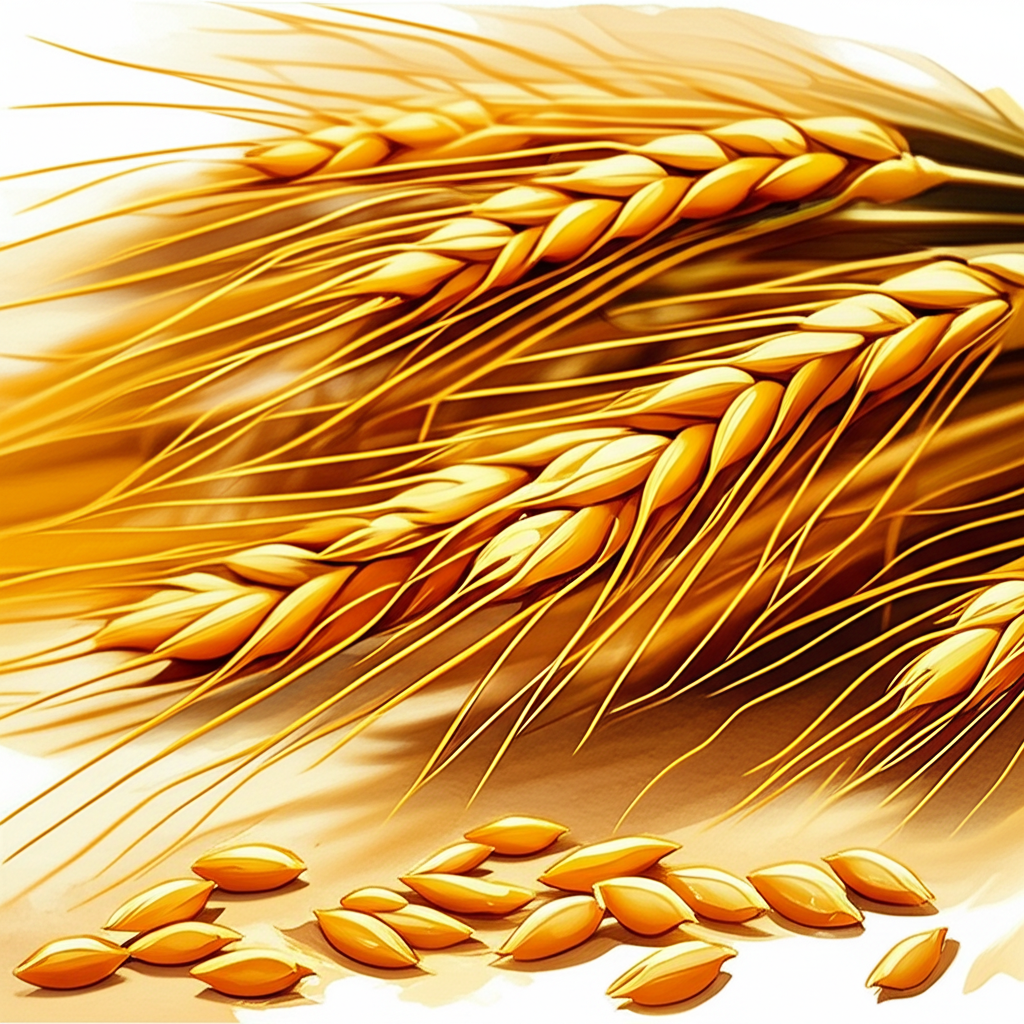
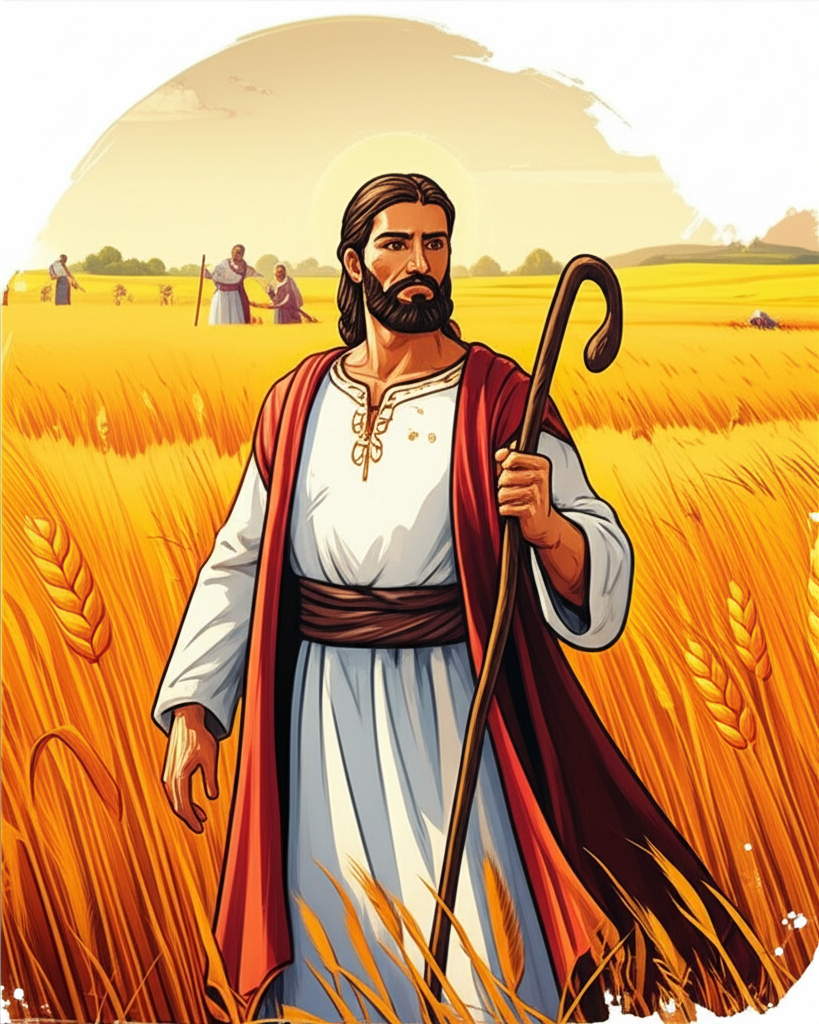

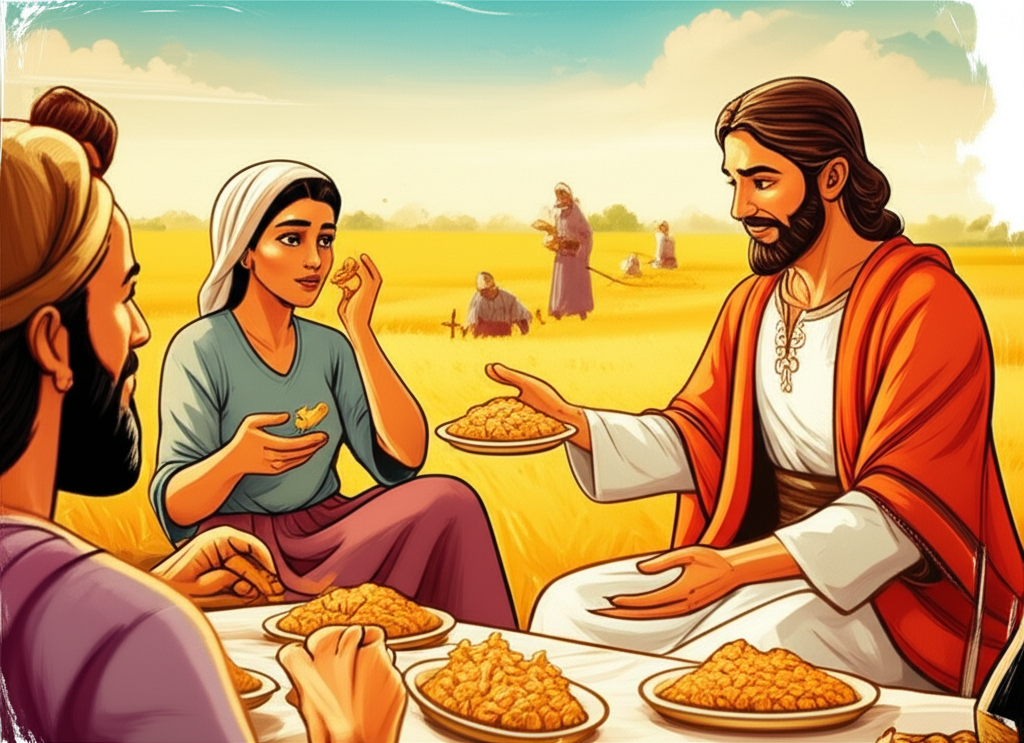
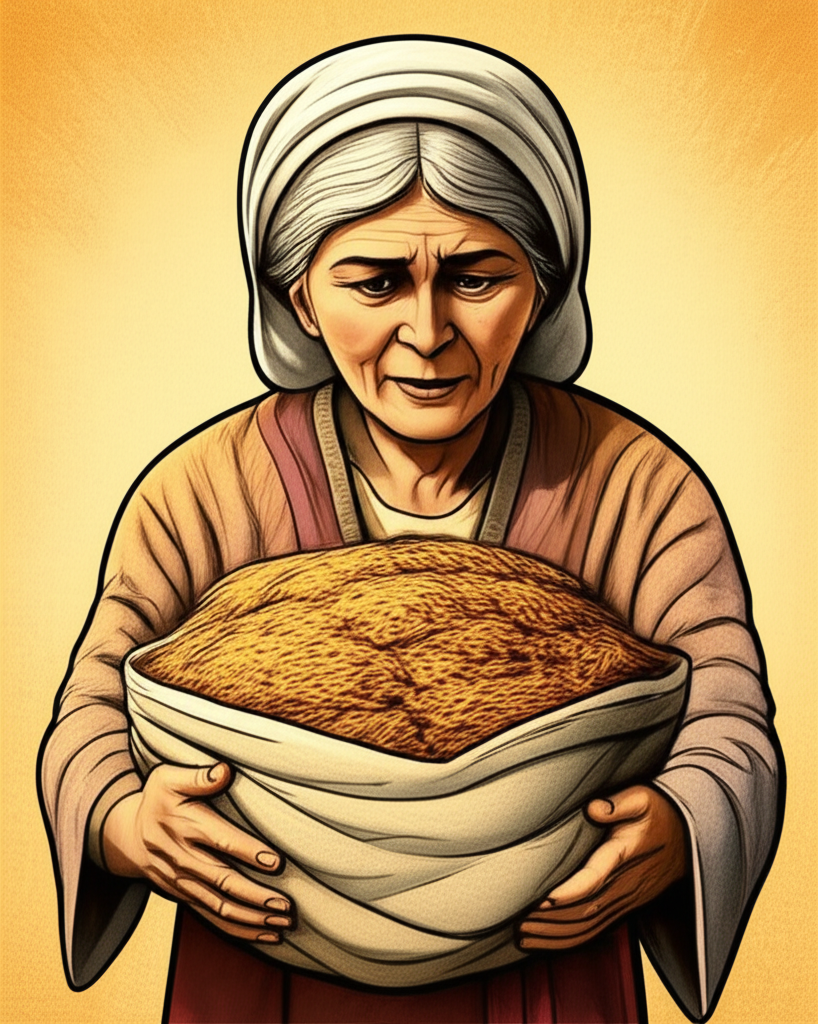
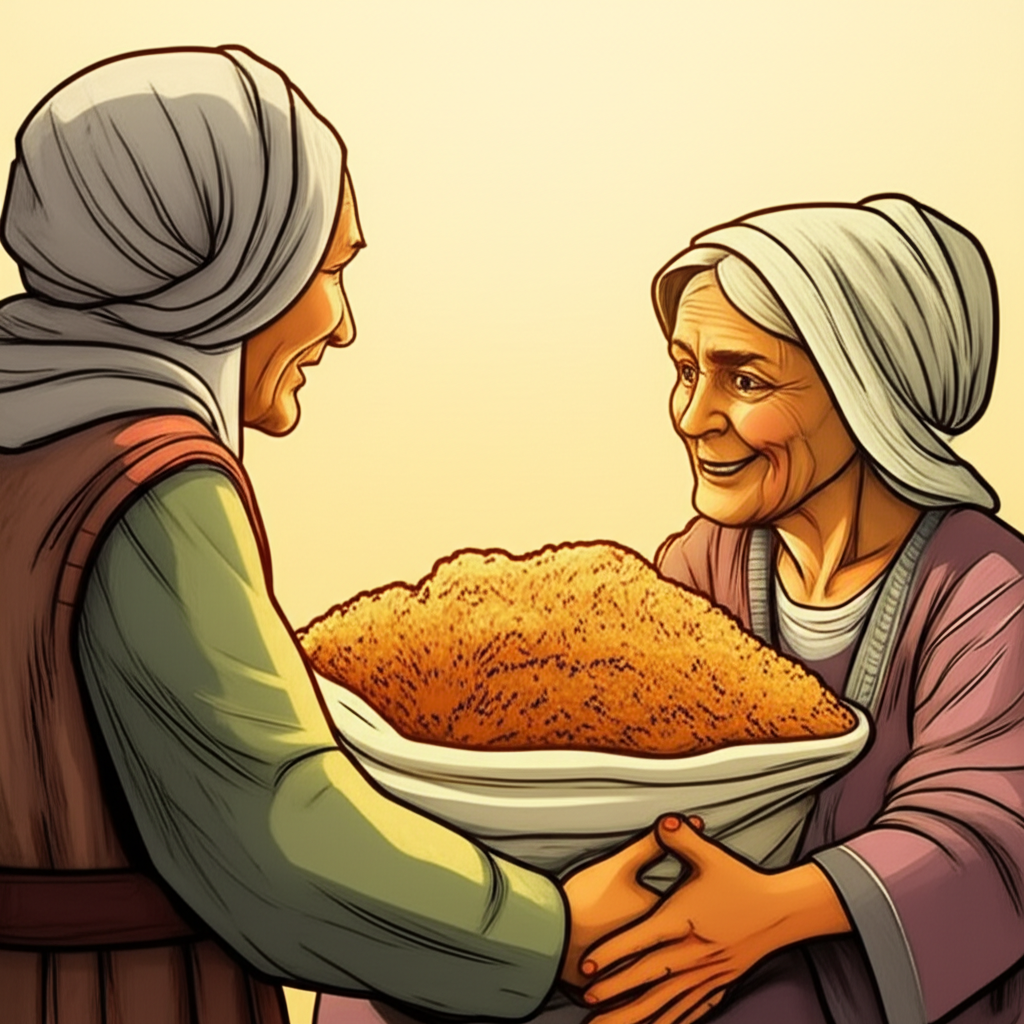
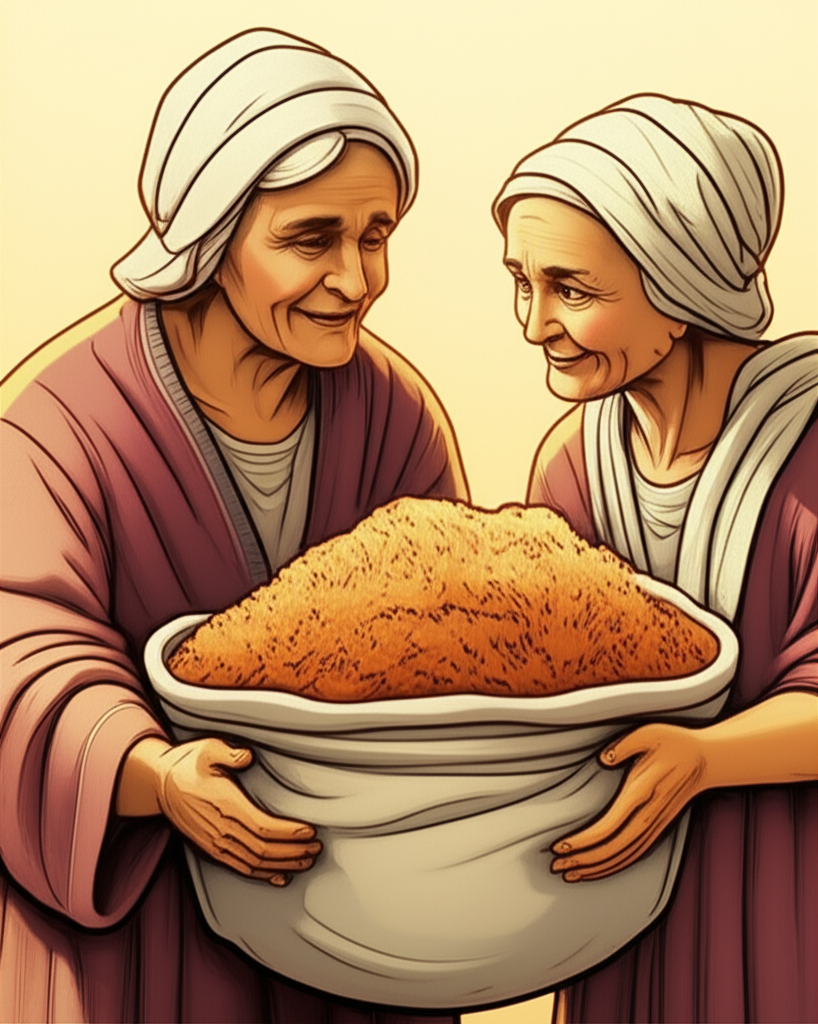
Ruth chapter 2 kjv
- 1 And Naomi had a kinsman of her husband's, a mighty man of wealth, of the family of Elimelech; and his name was Boaz.
- 2 And Ruth the Moabitess said unto Naomi, Let me now go to the field, and glean ears of corn after him in whose sight I shall find grace. And she said unto her, Go, my daughter.
- 3 And she went, and came, and gleaned in the field after the reapers: and her hap was to light on a part of the field belonging unto Boaz, who was of the kindred of Elimelech.
- 4 And, behold, Boaz came from Bethlehem, and said unto the reapers, The LORD be with you. And they answered him, The LORD bless thee.
- 5 Then said Boaz unto his servant that was set over the reapers, Whose damsel is this?
- 6 And the servant that was set over the reapers answered and said, It is the Moabitish damsel that came back with Naomi out of the country of Moab:
- 7 And she said, I pray you, let me glean and gather after the reapers among the sheaves: so she came, and hath continued even from the morning until now, that she tarried a little in the house.
- 8 Then said Boaz unto Ruth, Hearest thou not, my daughter? Go not to glean in another field, neither go from hence, but abide here fast by my maidens:
- 9 Let thine eyes be on the field that they do reap, and go thou after them: have I not charged the young men that they shall not touch thee? and when thou art athirst, go unto the vessels, and drink of that which the young men have drawn.
- 10 Then she fell on her face, and bowed herself to the ground, and said unto him, Why have I found grace in thine eyes, that thou shouldest take knowledge of me, seeing I am a stranger?
- 11 And Boaz answered and said unto her, It hath fully been showed me, all that thou hast done unto thy mother in law since the death of thine husband: and how thou hast left thy father and thy mother, and the land of thy nativity, and art come unto a people which thou knewest not heretofore.
- 12 The LORD recompense thy work, and a full reward be given thee of the LORD God of Israel, under whose wings thou art come to trust.
- 13 Then she said, Let me find favor in thy sight, my lord; for that thou hast comforted me, and for that thou hast spoken friendly unto thine handmaid, though I be not like unto one of thine handmaidens.
- 14 And Boaz said unto her, At mealtime come thou hither, and eat of the bread, and dip thy morsel in the vinegar. And she sat beside the reapers: and he reached her parched corn, and she did eat, and was sufficed, and left.
- 15 And when she was risen up to glean, Boaz commanded his young men, saying, Let her glean even among the sheaves, and reproach her not:
- 16 And let fall also some of the handfuls of purpose for her, and leave them, that she may glean them, and rebuke her not.
- 17 So she gleaned in the field until even, and beat out that she had gleaned: and it was about an ephah of barley.
- 18 And she took it up, and went into the city: and her mother in law saw what she had gleaned: and she brought forth, and gave to her that she had reserved after she was sufficed.
- 19 And her mother in law said unto her, Where hast thou gleaned to day? and where wroughtest thou? blessed be he that did take knowledge of thee. And she showed her mother in law with whom she had wrought, and said, The man's name with whom I wrought to day is Boaz.
- 20 And Naomi said unto her daughter in law, Blessed be he of the LORD, who hath not left off his kindness to the living and to the dead. And Naomi said unto her, The man is near of kin unto us, one of our next kinsmen.
- 21 And Ruth the Moabitess said, He said unto me also, Thou shalt keep fast by my young men, until they have ended all my harvest.
- 22 And Naomi said unto Ruth her daughter in law, It is good, my daughter, that thou go out with his maidens, that they meet thee not in any other field.
- 23 So she kept fast by the maidens of Boaz to glean unto the end of barley harvest and of wheat harvest; and dwelt with her mother in law.
Ruth chapter 2 nkjv
- 1 There was a relative of Naomi's husband, a man of great wealth, of the family of Elimelech. His name was Boaz.
- 2 So Ruth the Moabitess said to Naomi, "Please let me go to the field, and glean heads of grain after him in whose sight I may find favor." And she said to her, "Go, my daughter."
- 3 Then she left, and went and gleaned in the field after the reapers. And she happened to come to the part of the field belonging to Boaz, who was of the family of Elimelech.
- 4 Now behold, Boaz came from Bethlehem, and said to the reapers, "The LORD be with you!" And they answered him, "The LORD bless you!"
- 5 Then Boaz said to his servant who was in charge of the reapers, "Whose young woman is this?"
- 6 So the servant who was in charge of the reapers answered and said, "It is the young Moabite woman who came back with Naomi from the country of Moab.
- 7 And she said, 'Please let me glean and gather after the reapers among the sheaves.' So she came and has continued from morning until now, though she rested a little in the house."
- 8 Then Boaz said to Ruth, "You will listen, my daughter, will you not? Do not go to glean in another field, nor go from here, but stay close by my young women.
- 9 Let your eyes be on the field which they reap, and go after them. Have I not commanded the young men not to touch you? And when you are thirsty, go to the vessels and drink from what the young men have drawn."
- 10 So she fell on her face, bowed down to the ground, and said to him, "Why have I found favor in your eyes, that you should take notice of me, since I am a foreigner?"
- 11 And Boaz answered and said to her, "It has been fully reported to me, all that you have done for your mother-in-law since the death of your husband, and how you have left your father and your mother and the land of your birth, and have come to a people whom you did not know before.
- 12 The LORD repay your work, and a full reward be given you by the LORD God of Israel, under whose wings you have come for refuge."
- 13 Then she said, "Let me find favor in your sight, my lord; for you have comforted me, and have spoken kindly to your maidservant, though I am not like one of your maidservants."
- 14 Now Boaz said to her at mealtime, "Come here, and eat of the bread, and dip your piece of bread in the vinegar." So she sat beside the reapers, and he passed parched grain to her; and she ate and was satisfied, and kept some back.
- 15 And when she rose up to glean, Boaz commanded his young men, saying, "Let her glean even among the sheaves, and do not reproach her.
- 16 Also let grain from the bundles fall purposely for her; leave it that she may glean, and do not rebuke her."
- 17 So she gleaned in the field until evening, and beat out what she had gleaned, and it was about an ephah of barley.
- 18 Then she took it up and went into the city, and her mother-in-law saw what she had gleaned. So she brought out and gave to her what she had kept back after she had been satisfied.
- 19 And her mother-in-law said to her, "Where have you gleaned today? And where did you work? Blessed be the one who took notice of you." So she told her mother-in-law with whom she had worked, and said, "The man's name with whom I worked today is Boaz."
- 20 Then Naomi said to her daughter-in-law, "Blessed be he of the LORD, who has not forsaken His kindness to the living and the dead!" And Naomi said to her, "This man is a relation of ours, one of our close relatives."
- 21 Ruth the Moabitess said, "He also said to me, 'You shall stay close by my young men until they have finished all my harvest.' "
- 22 And Naomi said to Ruth her daughter-in-law, "It is good, my daughter, that you go out with his young women, and that people do not meet you in any other field."
- 23 So she stayed close by the young women of Boaz, to glean until the end of barley harvest and wheat harvest; and she dwelt with her mother-in-law.
Ruth chapter 2 niv
- 1 Now Naomi had a relative on her husband's side, a man of standing from the clan of Elimelek, whose name was Boaz.
- 2 And Ruth the Moabite said to Naomi, "Let me go to the fields and pick up the leftover grain behind anyone in whose eyes I find favor." Naomi said to her, "Go ahead, my daughter."
- 3 So she went out, entered a field and began to glean behind the harvesters. As it turned out, she was working in a field belonging to Boaz, who was from the clan of Elimelek.
- 4 Just then Boaz arrived from Bethlehem and greeted the harvesters, "The LORD be with you!" "The LORD bless you!" they answered.
- 5 Boaz asked the overseer of his harvesters, "Who does that young woman belong to?"
- 6 The overseer replied, "She is the Moabite who came back from Moab with Naomi.
- 7 She said, 'Please let me glean and gather among the sheaves behind the harvesters.' She came into the field and has remained here from morning till now, except for a short rest in the shelter."
- 8 So Boaz said to Ruth, "My daughter, listen to me. Don't go and glean in another field and don't go away from here. Stay here with the women who work for me.
- 9 Watch the field where the men are harvesting, and follow along after the women. I have told the men not to lay a hand on you. And whenever you are thirsty, go and get a drink from the water jars the men have filled."
- 10 At this, she bowed down with her face to the ground. She asked him, "Why have I found such favor in your eyes that you notice me?a foreigner?"
- 11 Boaz replied, "I've been told all about what you have done for your mother-in-law since the death of your husband?how you left your father and mother and your homeland and came to live with a people you did not know before.
- 12 May the LORD repay you for what you have done. May you be richly rewarded by the LORD, the God of Israel, under whose wings you have come to take refuge."
- 13 "May I continue to find favor in your eyes, my lord," she said. "You have put me at ease by speaking kindly to your servant?though I do not have the standing of one of your servants."
- 14 At mealtime Boaz said to her, "Come over here. Have some bread and dip it in the wine vinegar." When she sat down with the harvesters, he offered her some roasted grain. She ate all she wanted and had some left over.
- 15 As she got up to glean, Boaz gave orders to his men, "Let her gather among the sheaves and don't reprimand her.
- 16 Even pull out some stalks for her from the bundles and leave them for her to pick up, and don't rebuke her."
- 17 So Ruth gleaned in the field until evening. Then she threshed the barley she had gathered, and it amounted to about an ephah.
- 18 She carried it back to town, and her mother-in-law saw how much she had gathered. Ruth also brought out and gave her what she had left over after she had eaten enough.
- 19 Her mother-in-law asked her, "Where did you glean today? Where did you work? Blessed be the man who took notice of you!" Then Ruth told her mother-in-law about the one at whose place she had been working. "The name of the man I worked with today is Boaz," she said.
- 20 "The LORD bless him!" Naomi said to her daughter-in-law. "He has not stopped showing his kindness to the living and the dead." She added, "That man is our close relative; he is one of our guardian-redeemers."
- 21 Then Ruth the Moabite said, "He even said to me, 'Stay with my workers until they finish harvesting all my grain.'?"
- 22 Naomi said to Ruth her daughter-in-law, "It will be good for you, my daughter, to go with the women who work for him, because in someone else's field you might be harmed."
- 23 So Ruth stayed close to the women of Boaz to glean until the barley and wheat harvests were finished. And she lived with her mother-in-law.
Ruth chapter 2 esv
- 1 Now Naomi had a relative of her husband's, a worthy man of the clan of Elimelech, whose name was Boaz.
- 2 And Ruth the Moabite said to Naomi, "Let me go to the field and glean among the ears of grain after him in whose sight I shall find favor." And she said to her, "Go, my daughter."
- 3 So she set out and went and gleaned in the field after the reapers, and she happened to come to the part of the field belonging to Boaz, who was of the clan of Elimelech.
- 4 And behold, Boaz came from Bethlehem. And he said to the reapers, "The LORD be with you!" And they answered, "The LORD bless you."
- 5 Then Boaz said to his young man who was in charge of the reapers, "Whose young woman is this?"
- 6 And the servant who was in charge of the reapers answered, "She is the young Moabite woman, who came back with Naomi from the country of Moab.
- 7 She said, 'Please let me glean and gather among the sheaves after the reapers.' So she came, and she has continued from early morning until now, except for a short rest."
- 8 Then Boaz said to Ruth, "Now, listen, my daughter, do not go to glean in another field or leave this one, but keep close to my young women.
- 9 Let your eyes be on the field that they are reaping, and go after them. Have I not charged the young men not to touch you? And when you are thirsty, go to the vessels and drink what the young men have drawn."
- 10 Then she fell on her face, bowing to the ground, and said to him, "Why have I found favor in your eyes, that you should take notice of me, since I am a foreigner?"
- 11 But Boaz answered her, "All that you have done for your mother-in-law since the death of your husband has been fully told to me, and how you left your father and mother and your native land and came to a people that you did not know before.
- 12 The LORD repay you for what you have done, and a full reward be given you by the LORD, the God of Israel, under whose wings you have come to take refuge!"
- 13 Then she said, "I have found favor in your eyes, my lord, for you have comforted me and spoken kindly to your servant, though I am not one of your servants."
- 14 And at mealtime Boaz said to her, "Come here and eat some bread and dip your morsel in the wine." So she sat beside the reapers, and he passed to her roasted grain. And she ate until she was satisfied, and she had some left over.
- 15 When she rose to glean, Boaz instructed his young men, saying, "Let her glean even among the sheaves, and do not reproach her.
- 16 And also pull out some from the bundles for her and leave it for her to glean, and do not rebuke her."
- 17 So she gleaned in the field until evening. Then she beat out what she had gleaned, and it was about an ephah of barley.
- 18 And she took it up and went into the city. Her mother-in-law saw what she had gleaned. She also brought out and gave her what food she had left over after being satisfied.
- 19 And her mother-in-law said to her, "Where did you glean today? And where have you worked? Blessed be the man who took notice of you." So she told her mother-in-law with whom she had worked and said, "The man's name with whom I worked today is Boaz."
- 20 And Naomi said to her daughter-in-law, "May he be blessed by the LORD, whose kindness has not forsaken the living or the dead!" Naomi also said to her, "The man is a close relative of ours, one of our redeemers."
- 21 And Ruth the Moabite said, "Besides, he said to me, 'You shall keep close by my young men until they have finished all my harvest.'"
- 22 And Naomi said to Ruth, her daughter-in-law, "It is good, my daughter, that you go out with his young women, lest in another field you be assaulted."
- 23 So she kept close to the young women of Boaz, gleaning until the end of the barley and wheat harvests. And she lived with her mother-in-law.
Ruth chapter 2 nlt
- 1 Now there was a wealthy and influential man in Bethlehem named Boaz, who was a relative of Naomi's husband, Elimelech.
- 2 One day Ruth the Moabite said to Naomi, "Let me go out into the harvest fields to pick up the stalks of grain left behind by anyone who is kind enough to let me do it." Naomi replied, "All right, my daughter, go ahead."
- 3 So Ruth went out to gather grain behind the harvesters. And as it happened, she found herself working in a field that belonged to Boaz, the relative of her father-in-law, Elimelech.
- 4 While she was there, Boaz arrived from Bethlehem and greeted the harvesters. "The LORD be with you!" he said. "The LORD bless you!" the harvesters replied.
- 5 Then Boaz asked his foreman, "Who is that young woman over there? Who does she belong to?"
- 6 And the foreman replied, "She is the young woman from Moab who came back with Naomi.
- 7 She asked me this morning if she could gather grain behind the harvesters. She has been hard at work ever since, except for a few minutes' rest in the shelter."
- 8 Boaz went over and said to Ruth, "Listen, my daughter. Stay right here with us when you gather grain; don't go to any other fields. Stay right behind the young women working in my field.
- 9 See which part of the field they are harvesting, and then follow them. I have warned the young men not to treat you roughly. And when you are thirsty, help yourself to the water they have drawn from the well."
- 10 Ruth fell at his feet and thanked him warmly. "What have I done to deserve such kindness?" she asked. "I am only a foreigner."
- 11 "Yes, I know," Boaz replied. "But I also know about everything you have done for your mother-in-law since the death of your husband. I have heard how you left your father and mother and your own land to live here among complete strangers.
- 12 May the LORD, the God of Israel, under whose wings you have come to take refuge, reward you fully for what you have done."
- 13 "I hope I continue to please you, sir," she replied. "You have comforted me by speaking so kindly to me, even though I am not one of your workers."
- 14 At mealtime Boaz called to her, "Come over here, and help yourself to some food. You can dip your bread in the sour wine." So she sat with his harvesters, and Boaz gave her some roasted grain to eat. She ate all she wanted and still had some left over.
- 15 When Ruth went back to work again, Boaz ordered his young men, "Let her gather grain right among the sheaves without stopping her.
- 16 And pull out some heads of barley from the bundles and drop them on purpose for her. Let her pick them up, and don't give her a hard time!"
- 17 So Ruth gathered barley there all day, and when she beat out the grain that evening, it filled an entire basket.
- 18 She carried it back into town and showed it to her mother-in-law. Ruth also gave her the roasted grain that was left over from her meal.
- 19 "Where did you gather all this grain today?" Naomi asked. "Where did you work? May the LORD bless the one who helped you!" So Ruth told her mother-in-law about the man in whose field she had worked. She said, "The man I worked with today is named Boaz."
- 20 "May the LORD bless him!" Naomi told her daughter-in-law. "He is showing his kindness to us as well as to your dead husband. That man is one of our closest relatives, one of our family redeemers."
- 21 Then Ruth said, "What's more, Boaz even told me to come back and stay with his harvesters until the entire harvest is completed."
- 22 "Good!" Naomi exclaimed. "Do as he said, my daughter. Stay with his young women right through the whole harvest. You might be harassed in other fields, but you'll be safe with him."
- 23 So Ruth worked alongside the women in Boaz's fields and gathered grain with them until the end of the barley harvest. Then she continued working with them through the wheat harvest in early summer. And all the while she lived with her mother-in-law.
- Bible Book of Ruth
- 1 Story of Ruth and Naomi
- 2 Boaz and Ruth
- 3 Ruth and Boaz at the Threshing Floor
- 4 Boaz marries and redeems Ruth